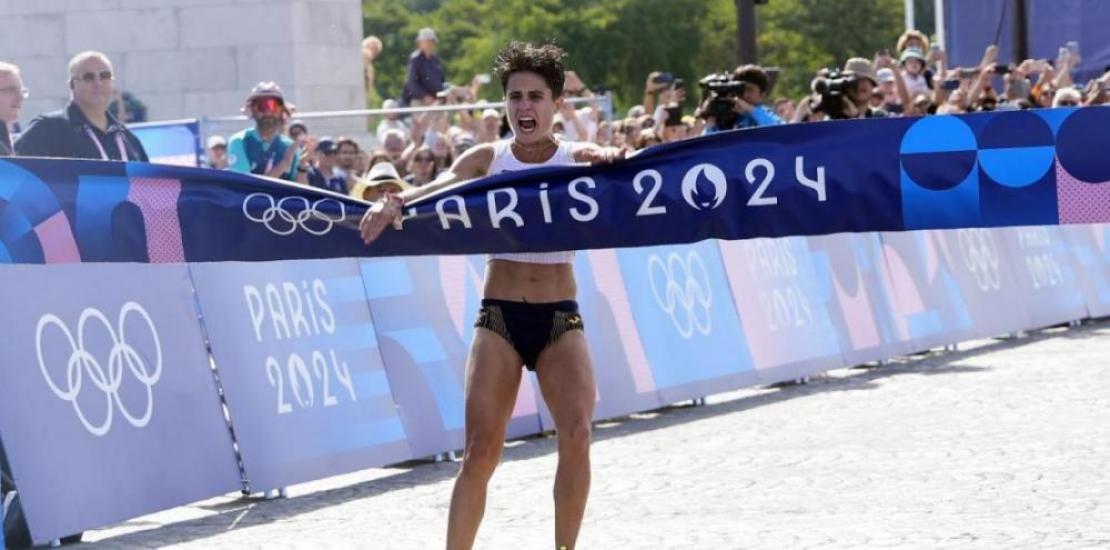UCAM conquers the Paris Games with fifteen medallists and 33 diplomas
María Pérez (athletics), Bea Ortiz and Nona Pérez (water polo), Íñigo Llopis (swimming) and Sergio Garrote (cycling) are the UCAM athletes who have won gold medals at the 2024 Olympic and Paralympic Games
The Paris Games have come to an end after an intense summer of Olympic and Paralympic sport. The French capital has passed the torch on to Los Angeles after brilliantly hosting the biggest sporting event in the world. At this marvellous event, UCAM athletes have obtained historic results as a reflection of the university's commitment to sport through its alliance with the Spanish Olympic Committee.
Fifteen UCAM athletes won medals: five gold, three silver and seven bronze. Spanish race walking took centre stage in Paris thanks to María Pérez who, accompanied by Álvaro Martín, protégé of the UCAM Athleo coach José Antonio Carrillo, rose to the top in the mixed relay event, adding the gold medal to the silver medal she won in the 20km walk the previous week.
The water polo players Bea Ortiz, student of the Master's Degree in Communication Management, and Nona Pérez, from the Degree in Psychology, were also proclaimed Olympic champions, with the women's national team.
In the Paralympic Games there were also UCAM athletes on the top step of the podium: swimmer Íñigo Llopis, a student of the Degree in Primary Education, who won the 100m backstroke S9, and Sergio Garrote, a cyclist who won two medals: one gold (time trial) and one silver (road).
In Spanish Olympic boxing, UCAM athletes also played a leading role. Ayoub Ghadfa won the silver medal in the over 92 kg category. Meanwhile, Great Britain's wheelchair basketball team, featuring university students Lee Fryer and Peter Cusack, also took second place.
Eight athletes from the UCAM-COE alliance returned from Paris 2024 with bronze medals: Abel Serdio, with the national handball team, canoeists Marcus Cooper, Rodrigo Germade, Carlos Arévalo and Saúl Craviotto and Paralympic swimmers Sarai Gascón, Íñigo Llopis and José Antonio Marí (4x100 medley relay). With this bronze, Craviotto has now become the all-time greatest Spanish medallist with six medals, surpassing the UCAM canoeist David Cal.
In terms of diplomas, 33 UCAM athletes have achieved a place as finalists in the Games, an achievement within the reach of very few that deserves to be recognised and highlighted.
Names such as Carolina Marín, who was injured during the tournament, canoeists Marcus Cooper, Adrián del Río and Antía Jacomé, shooter Mar Molné, athlete Quique Llopis and footballer Eva Navarro, swimmer Nahia Zudaire and athletes Adi Iglesias and Sara Andrés were among the Olympic athletes who finished the Games in fourth place.
The other Olympic and Paralympic diplomas went to shooter Fátima Gálvez, table tennis player María Xiao, boxer José Quiles, basketball player Laura Gil, taekwondists Adrián Vicente and Javier Pérez Polo, swimmers Jacobo Garrido, Hugo González de Oliveira, Sarai Gascón, Íñigo Llopis, athlete Adi Iglesias, archer Elia Canales, canoeists Antía Jacomé, Sara Ouzande and Teresa Portela, water polo player Álvaro Granados, members of the Spanish wheelchair basketball team Pablo Zarzuela and Lalo Prieto (men) and Sonia Ruíz, Vicky Vilariño, Lourdes Ortega and Bea Zudaire (women) and Luigi Makambo, with the French men's team. Physiotherapist Marta Vargas and coach Franck Belén were part of the BSR women's national team that won the diploma.
Next goal: Los Angeles 2028
This marks the end of a historic event in which the results of the UCAM - COE alliance have once again reaped their rewards. The alliance was created in 2012 by Alejandro Blanco, president of the Spanish Olympic Committee, and José Luis Mendoza, UCAM founder, and has been continued with María Dolores García at the head of the university institution. The model, which has been recognised internationally, facilitates the dual career of the athlete. It allows athletes to combine their professional sporting career with their studies.




